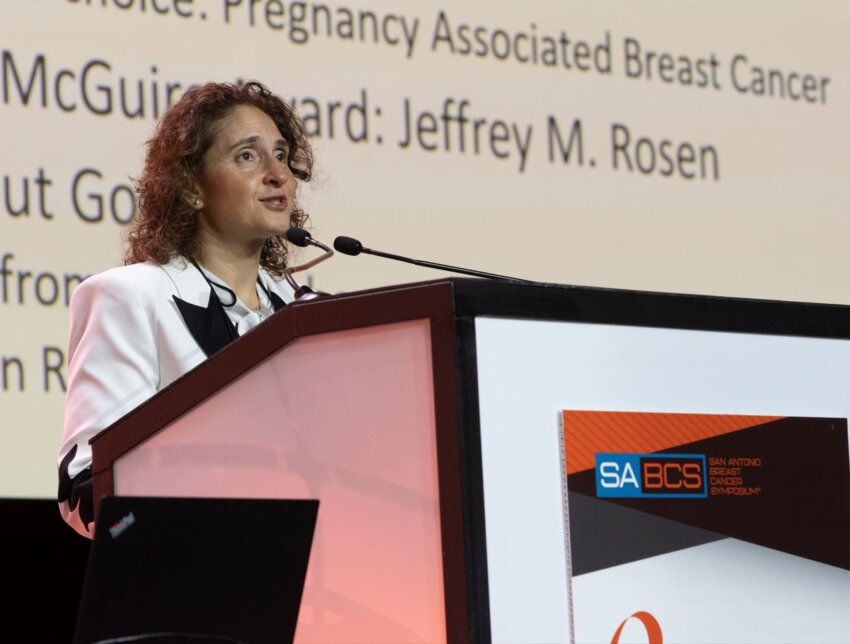Recognized as world’s largest gathering of breast cancer researchers
Contact: Eileen Teves, 210-450-7239, tevese@uthscsa.edu
SAN ANTONIO – Mays Cancer Center at UT Health San Antonio, in partnership with American Association for Cancer Research (AACR), is hosting the 46th annual San Antonio Breast Cancer Symposium (SABCS) at the Henry B. Gonzalez Convention Center on Dec. 5-9.
This scientific and education symposium, initiated and owned by Mays Cancer Center, is the world’s largest symposium of breast cancer research with close to 10,000 clinicians, researchers and patient advocates from more than 90 countries convening in downtown San Antonio. A National Cancer Institute (NCI)-designated Cancer Center, the Mays Cancer Center launched the symposium in 1977 as a one-day regional conference. After more than four decades, SABCS has grown to international importance.
“We are excited to host the San Antonio Breast Cancer Symposium, an event dedicated to improving prevention, diagnosis and treatment of breast cancer,” said Virginia Kaklamani, MD, leader of the Breast Cancer Program at the Mays Cancer Center and professor of medicine at The University of Texas Health Science Center at San Antonio. “As we welcome thousands of researchers and clinicians from around the world, we are committed to meeting the needs of patients through high-quality care and equal access to services.”
Kaklamani is an SABCS co-director with Carlos Arteaga, MD, director of the Harold C. Simmons Comprehensive Cancer Center at The University of Texas Southwestern Medical Center in Dallas.
On Dec. 5, Kaklamani will serve as a panelist for the first special session about new drug approvals for metastatic breast cancer. She will discuss results from the Phase III clinical trial for elacestrant, a treatment for postmenopausal women and adult men with ER+/HER2-advanced or metastatic breast cancer. The Mays Cancer Center was a lead site for the Phase I and Phase III clinical trials for elacestrant. As a member of the steering committee, Kaklamani was part of the drug’s development during both trials, which showed positive results compared to the standard of care therapy.
On the same day, Amelie Ramirez, DrPH, MPH, director of the Institute for Health Promotion Research, chair of the Department of Population Health Services at UT Health San Antonio, and associate director of the Community Outreach and Engagement Program at Mays Cancer Center, will serve as moderator and presenter. In her presentation, Ramirez will explore how health is influenced by a variety of non-medical factors, such as the conditions in which people are born, grow, live, work and age. Known as social determinants of health (SDoH), these conditions will be discussed, including how they are key to improving health and cancer care for Hispanics and all people.
Other SABCS presenters from UT Health San Antonio include Kate Lathrop, MD, breast medical oncologist at Mays Cancer Center and associate professor of medicine at UT Health San Antonio. Lathrop’s poster presentation on Dec. 7 will cover a Phase I study of a novel drug, D-0502, for hormone receptor-positive breast cancer in women with metastatic breast cancer and have received multiple treatments for breast cancer. This new medication works by interfering with the estrogen receptor on cancer cells and slowing the growth of breast cancer cells in the body. Results of the study will be announced at the symposium.
On Dec. 8, Marcela Mazo Canola, MD, breast oncologist at Mays Cancer Center and assistant professor at UT Health San Antonio, co-authored a poster presentation with Kaklamani, addressing racial disparities in breast cancer, particularly in the Hispanic community. The presentation states Hispanics are more likely to be diagnosed with aggressive early-stage breast cancer compared to Non-Hispanic Whites. The study compared tumors from Hispanic and White patients and discovered differences in genes linked to immune-related pathways and inflammatory response.
To learn more about the San Antonio Breast Cancer Symposium, visit sabcs.org.
The University of Texas Health Science Center at San Antonio (UT Health San Antonio) is one of the country’s leading health science universities and is designated as a Hispanic-Serving Institution by the U.S. Department of Education. With missions of teaching, research, patient care and community engagement, its schools of medicine, nursing, dentistry, health professions, graduate biomedical sciences and public health have graduated more than 42,200 alumni who are leading change, advancing their fields and renewing hope for patients and their families throughout South Texas and the world. To learn about the many ways “We make lives better®,” visit UTHealthSA.org.
Stay connected with The University of Texas Health Science Center at San Antonio on Facebook, Twitter, LinkedIn, Instagram and YouTube.
The Mays Cancer Center at UT Health San Antonio is one of only four National Cancer Institute-designated Cancer Centers in Texas. The Mays Cancer Center provides leading-edge cancer care, propels innovative cancer research and educates the next generation of leaders to end cancer in South Texas. To learn more, visit https://cancer.uthscsa.edu.
Stay connected with the Mays Cancer Center on Facebook, Twitter, LinkedIn, Instagram and YouTube.


